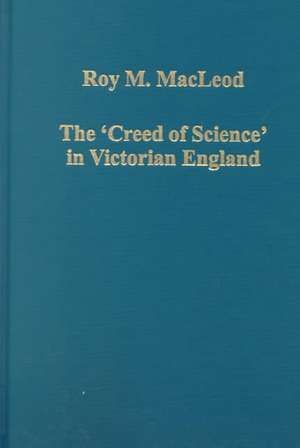The 'Creed of Science' in Victorian England: Variorum Collected Studies
Autor Roy M. MacLeoden Limba Engleză Hardback – 28 apr 2000
Din seria Variorum Collected Studies
-
 Preț: 313.38 lei
Preț: 313.38 lei -
 Preț: 311.41 lei
Preț: 311.41 lei -
 Preț: 299.55 lei
Preț: 299.55 lei -
 Preț: 325.68 lei
Preț: 325.68 lei -
 Preț: 406.12 lei
Preț: 406.12 lei -
 Preț: 311.18 lei
Preț: 311.18 lei -
 Preț: 325.31 lei
Preț: 325.31 lei -
 Preț: 396.01 lei
Preț: 396.01 lei - 9%
 Preț: 1039.89 lei
Preț: 1039.89 lei -
 Preț: 266.20 lei
Preț: 266.20 lei -
 Preț: 343.34 lei
Preț: 343.34 lei - 9%
 Preț: 938.10 lei
Preț: 938.10 lei -
 Preț: 351.48 lei
Preț: 351.48 lei - 9%
 Preț: 938.86 lei
Preț: 938.86 lei -
 Preț: 335.37 lei
Preț: 335.37 lei - 9%
 Preț: 937.14 lei
Preț: 937.14 lei -
 Preț: 351.42 lei
Preț: 351.42 lei -
 Preț: 320.00 lei
Preț: 320.00 lei - 38%
 Preț: 766.84 lei
Preț: 766.84 lei - 23%
 Preț: 315.48 lei
Preț: 315.48 lei - 36%
 Preț: 740.06 lei
Preț: 740.06 lei - 34%
 Preț: 764.20 lei
Preț: 764.20 lei - 39%
 Preț: 684.75 lei
Preț: 684.75 lei - 29%
 Preț: 247.40 lei
Preț: 247.40 lei - 37%
 Preț: 488.89 lei
Preț: 488.89 lei - 38%
 Preț: 766.91 lei
Preț: 766.91 lei - 34%
 Preț: 769.51 lei
Preț: 769.51 lei - 38%
 Preț: 769.85 lei
Preț: 769.85 lei - 36%
 Preț: 823.43 lei
Preț: 823.43 lei - 25%
 Preț: 225.28 lei
Preț: 225.28 lei - 25%
 Preț: 225.54 lei
Preț: 225.54 lei - 34%
 Preț: 767.07 lei
Preț: 767.07 lei - 34%
 Preț: 764.20 lei
Preț: 764.20 lei - 34%
 Preț: 736.38 lei
Preț: 736.38 lei - 34%
 Preț: 738.43 lei
Preț: 738.43 lei - 25%
 Preț: 226.52 lei
Preț: 226.52 lei - 33%
 Preț: 491.66 lei
Preț: 491.66 lei - 34%
 Preț: 485.78 lei
Preț: 485.78 lei - 34%
 Preț: 485.78 lei
Preț: 485.78 lei - 38%
 Preț: 766.34 lei
Preț: 766.34 lei - 36%
 Preț: 739.17 lei
Preț: 739.17 lei - 31%
 Preț: 473.94 lei
Preț: 473.94 lei - 18%
 Preț: 843.63 lei
Preț: 843.63 lei - 38%
 Preț: 774.91 lei
Preț: 774.91 lei - 38%
 Preț: 769.92 lei
Preț: 769.92 lei - 34%
 Preț: 764.20 lei
Preț: 764.20 lei - 50%
 Preț: 488.81 lei
Preț: 488.81 lei - 36%
 Preț: 488.49 lei
Preț: 488.49 lei - 34%
 Preț: 769.10 lei
Preț: 769.10 lei - 38%
 Preț: 766.99 lei
Preț: 766.99 lei
Preț: 489.31 lei
Preț vechi: 775.08 lei
-37% Nou
Puncte Express: 734
Preț estimativ în valută:
93.63€ • 100.12$ • 78.07£
93.63€ • 100.12$ • 78.07£
Comandă specială
Livrare economică 28 martie-11 aprilie
Doresc să fiu notificat când acest titlu va fi disponibil:
Se trimite...
Preluare comenzi: 021 569.72.76
Specificații
ISBN-13: 9780860786696
ISBN-10: 0860786692
Pagini: 346
Dimensiuni: 150 x 224 x 21 mm
Greutate: 0.65 kg
Ediția:1
Editura: Taylor & Francis
Colecția Routledge
Seria Variorum Collected Studies
Locul publicării:Oxford, United Kingdom
ISBN-10: 0860786692
Pagini: 346
Dimensiuni: 150 x 224 x 21 mm
Greutate: 0.65 kg
Ediția:1
Editura: Taylor & Francis
Colecția Routledge
Seria Variorum Collected Studies
Locul publicării:Oxford, United Kingdom
Public țintă
Academic and PostgraduateCuprins
Contents: Introduction; The X-Club: a social network in late-Victorian England; The scientists’s declaration: reflections on science and belief in the wake of Essays and Reviews, 1864-1865; The ’bankruptcy of science’ debate: the ’creed of science’ and its critics, 1885-1900; Evolutionism, internationalism and commercial enterprise in science: the international scientific series, 1871-1910; Education - scientific and technical; Fathers and daughters: reflections on women, science and Victorian Cambridge; The ’naturals’ and Victorian Cambridge: reflections on the anatomy of an elite, 1851-1914; Breaking the circle of science: the natural sciences tripos and the ’examination revolution’; Scientific careers of 1851 exhibition scholars; The genesis of Nature; The social framework of Nature in its first fifty years; Science, progressivism and ’practical idealism’: reflections on efficient imperialism and federal science in Australia, 1895-1915; Index.
Recenzii
'He has done more than most to facilitate our understanding of the debates around scientific naturalism...An extremely readable collection', British Journal for the History of Science, vol.34, no.1 'This most instructive volume provides a fascinating backdrop to some of the current controversies surrounding the science-religion field... there is a great deal of general interest in this book, especially for students of the science/religion interface.' Network '... a valuable collection. The convenience of having all of these essays collected together in one place makes it more likely that they will be read as a group, allowing the reader to consider their impact as a whole and come to a greater appreciation of MacLeod's anticipations of so many themes that now command the attention of historians of Victorian science.' ISIS
Descriere
The nineteenth century, which saw the triumph of the idea of progress and improvement, saw also the triumph of science as a political and cultural force. In England, as science and its methods claimed privilege and space, its language acquired the vocabulary of religion. The new ’creed’ of science embraced what John Tyndall called the ’scientific movement’; it was, in the language of T.H. Huxley, a militant creed. The ’march’ of invention, the discoveries of chemistry, and the wonders of steam and electricity culminated in a crusade against ignorance and unbelief. It was a creed that looked to its own apostolic succession from Copernicus, Galileo and the martyrs of the ’scientific revolution’. Yet, it was a creed whose doctrines were divisive, and whose convictions resisted. Alongside arguments for materialism, utility, positivism, and evolutionary naturalism, persisted reservations about the nature of man, the role of ethics, and the limits of scientific method. These essays discuss leading strategists in the scientific movement of late-Victorian England. At the same time, they show how ’science established’ served not only the scientific community, but also the interests of imperial and colonial powers.
